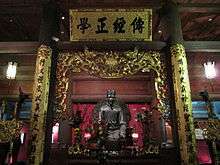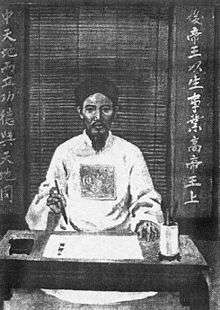Chu Văn An
Chu Văn An (1292–1370, born Chu An) was a Confucian, teacher, physician and high-ranking mandarin of the Trần Dynasty in Đại Việt.[1]
| Chu Văn An 朱文安 | |
|---|---|
 | |
| Vietnamese name | |
| Vietnamese | 朱文安 |
| Vietnamese alphabet | Chu Văn An |
| Hán-Nôm | 朱文安 |
Biography
He was born in Văn Thôn village, Quang Liệt commune, present day Thanh Tri district, Hanoi. In the early life, he was famous as a straightforward man who passed the doctoral examination (Thái Học Sinh / 太學生) but refused to become a mandarin. Instead, An opened a school and began his career as a Confucian teacher in Huỳnh Cung village in Thanh Tri. An's teaching played an important role in spreading Confucianism into a Buddhist Vietnam in this time.
Under the reign of Tran Minh Tong (1314–1329), he became a teacher at the imperial academy (國子監) where he was responsible for teaching the crown prince Vuong, the future emperor Tran Hien Tong. Under the reign of emperor Tran Du Tong, he was raised to a high-ranking mandarin.

Later, he resigned and return to his home-village because Tran Du Tong refused his request of beheading eight other mandarins who he accused of corruption.[2] For the rest of his life, An continued his teaching career and wrote books. He died of illness in 1370.
An altar was erected in his honour in the Temple of Literature in Hanoi, where he is still revered.
See also
- Chu Van An High School (Hanoi)
- Chu Van An High School (Ho Chi Minh City)
Notes
- Patricia M. Pelley Postcolonial Vietnam: New Histories of the National Past 2002 - Page 125 Chu Văn An
- A history of Vietnam: from Hong Bang to Tu Duc, p. 89, at Google Books
External links
![]()